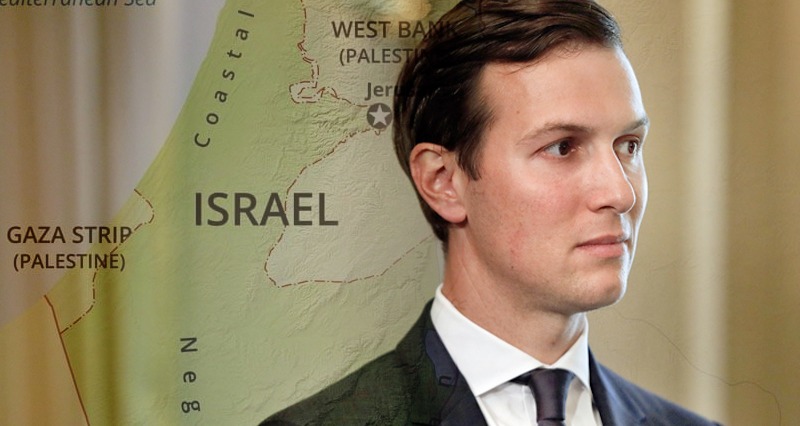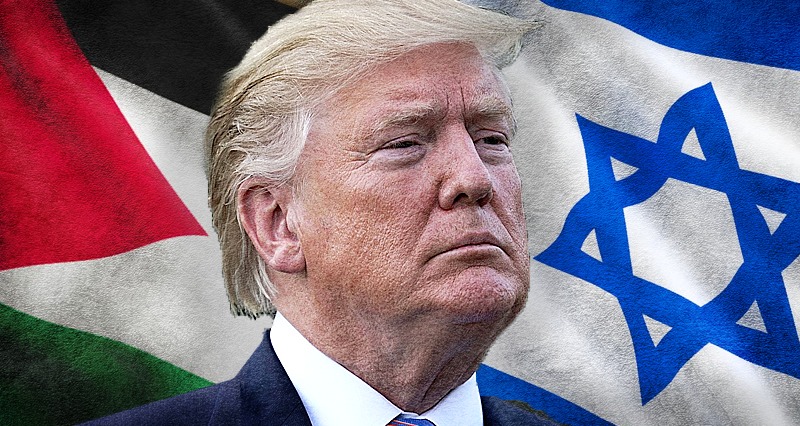Trump’s ‘Deal of the Century’ bills itself as an effort at establishing peace between Israel and Palestine, but in reality aims at advancing Israel’s interests, and fundamentally altering the geopolitical balance of the Middle East.
THE US’ TRUE MOTIVATIONS
The US established a new strategy in the Middle East after the end of World War II based on both its geopolitical competition with the Soviet Union and the growing importance of oil. The establishment of Israel in 1948 gave the United States a permanent foothold in the region, allowing Washington to break away from its European allies and compete for influence in the Middle East. The Suez war of 1956 and the resulting US entrenchment against England and France virtually ended Europe’s influence in the region.
However, Israel’s central importance for the US did not truly begin until the Six-day War. After Israel’s victory, Tel Aviv became Washington’s main regional ally, while increased foreign aid to Israel pitted the US against much of the Arab world. Up until that point, the US had been supporting both Israel and the local Arabs simultaneously in order to curb Soviet influence on both sides. Following the war, the Arabs were forced to reorient toward Europe, which eventually led to their receiving aid from some European countries during the war in 1973.
Following this war, the US better understood the potential danger the Arab population represented for Israel, and began serious efforts to establish peace. Plans designed to establish and legitimize Israel, such as the Camp David Accords, the Madrid Conference of 1991, the Oslo Accord, the Sharm El Sheikh Memorandum, the Hebron Protocol and the Taba Summit helped create a road map to establishing peace.
WHAT EXACTLY IS TRUMP’S ‘PEACE PLAN?’
Donald Trump, like many former US presidents, has made sustained efforts to maintain the security and sovereignty of Israel, and this plan is no different. By offering a wide variety of privileges to the Israeli state, Trump hopes that Israel will agree to recognize an independent Palestinian state in return.
The plan stipulates that the Palestinian side give up the “right of return,” which was granted under United Nations Security Council Resolution 194. This essentially means that from the very beginning, Trump’s plan stands in direct contradiction to the decisions of the UN security council.
The plan also demands that the Palestinian side accept Jerusalem as the capital of Israel, and name Abu Dis as their capital.
If that were not enough concessions, the deal also requires that the Palestinians forfeit the territories were Israel has already established settlements.
The most incredible part of the deal, however, is that the Palestinians would not be allowed to have an army or any armed forces with the exception of domestic police.

By examining these few paragraphs of the so-called “Deal of the Century” it is completely obvious that it was constructed almost solely in order to advance Israel’s interests at Palestine’s expense. These are just a few paragraphs of the massive plan that the US has released in order to measure public opinion… the rest of the document only gets worse.
ISRAELI AND PALESTINIAN REACTIONS
Israelis: the Israeli right-wing, especially the ruling Likud party and Jewish Home party, are calling the plan a huge victory and will likely do whatever they can to see it succeed. If the plan fails during Benjamin Netanyahu’s presidency, leftist parties such as the Israeli Labor Party and other parties like Meretz, Hadash and Hatnua will use the situation to their advantage. These parties oppose Trump’s plan on ideological grounds. Israeli leftist parties generally oppose increasing settlements and take up more pragmatic and realist positions regarding peace between Israel and Palestine. While they consider Trump’s plan impractical, they will not take any action to oppose it due to excessive pressure in Israel society.
Palestinians: Hamas and the Palestinian Islamic Jihad are naturally the central opponents of the deal. They see it as a long-term plan to destroy Palestine outright. However, the Palestinian National Authority also opposes the plan, arguing that the Trump administration has completely closed off the possibility of dialogue, and is now attempting to force the deal through with power plays and bribes.
The “Deal of the Century”, in other words, is not seen as such by the Palestinians, who have more or less completely rejected it. Furthermore, it only has traction in Israel so long as Netanyahu is prime minister.
OTHER COUNTRIES’ VIEWPOINTS
Turkey, Egypt, Jordan, Saudi Arabia, Iran, Russia and the United States are the most influential countries in relation to the deal.
Egypt and Jordan have expressed contradictory views on the agreement, speaking out against it one day and meeting with US officials to discuss its enactment the next. It seems that these two countries have no fundamental opposition to the plan, and are simply worried about the reaction of the Arab world, especially the Palestinians. Jordan is also concerned they might lose rights granted to them in previous peace plans as a result of the new deal.
Iran, which has significant influence on Hamas and in the Gaza Strip, opposes legitimizing Israel on principle, and therefore absolutely rejects the terms of the deal.
Saudi Arabia, on the other hand, is the deal’s main sponsor. Mohammad bin Salman seems to support the state of Israel, even remaining silent after the outrageous transmission of the US’ embassy to Jerusalem. By supporting the plan, Saudi Arabia hopes to change the geopolitical map of the Middle East to its advantage and simultaneously normalizing its relations with Israel.
In the US, three figures have spearheaded the deal, despite a total lack of political experience: Jared Kushner, David M. Friedman and Jason Greenblatt. As the author of the plan, the US has strongly indicated its extreme bias in favor of the Israeli side.

The EU will not support any plans in which they do not play a role, having more or less stepped away from the Arab-Israel peace since the 1991 Madrid peace talks. The Europeans are worried about Trump’s extremism and might act to oppose the plan. Most European countries refused to send representatives to Manama in June or at least neglected to send senior officials. However, with Boris Johnson taking over as prime minister in the UK, London’s position on the deal might be subject to revaluation.
Russia strongly criticized the plan, saying it attempts to “replace the task of achieving a comprehensive political solution” with economic incentives, adding that the plan would seriously damage the possibility of a two-state solution. Despite Moscow’s clear opposition, the Israeli and American lobbies have a strong influence on Russia, and could theoretically swing its position.
Turkey is another opponent of the deal of the century. Turkish President Recep Tayyip Erdoğan has called Israel an occupier, a terrorist state and inhuman, repeatedly and emphasizing his country’s support for Palestine. Ankara is one of Israel’s biggest roadblocks in conquering Palestine, helping to organize the Gaza Freedom Flotilla and hurting Israel’s image on the global stage.
HIDDEN TARGETS
As noted earlier, the most important clause of the plan is the one barring Palestine from being allowed to have an army.
This clause openly showcases Trump’s plan to completely disarm the Palestinians. Over the last seventy years, Israel and the US have only made real efforts toward peace when the Palestinian army poised a serious threat. If Palestine could not defend itself, it is evident that the country would quickly cease to exist.
The hidden agenda of the agreement is disarming the Palestinian side, while other clauses promote Israel’s interests. The deal seeks to create a scenario where the Palestinian side will not be able to take any action to defend themselves, or even enforce the meager provisions the deal provides them with.
Palestine is one of four main bases of the Muslim Brotherhood. US intervention in Egyptian domestic politics led to the fall of Mohamed Morsi’s government, which had formerly served as one of the brotherhood’s important strongholds. After that, Saudi Arabia, Israel, United States, Egypt, United Arab Emirates and Bahrain began to sanction Qatar to destroy yet another one of its bases, but Turkey’s support has so far helped to prevent this happening. Countries in the anti-Qatar coalition are naturally the most important backers of Trump’s deal, again taking aim at the Muslim Brotherhood. Aside from destroying Palestine, neutralizing the Brotherhood is clearly one of the most important goals of Trump’s plan.
Another goal is wide-scale geopolitical change in the Middle East. The US wants to redraw the map, eliminating all threats to Israel’s security and building an alliance between Israel, Egypt, Saudi Arabia and the United Arab Emirates while marginalizing Turkey, Iran, Qatar and Pakistan.
POSSIBLE OUTCOMES
Scenario A: the US forces Arab nations and the Palestinians to accept the deal. In such a scenario, Russia would have to have been pushed by lobbyists into agreement despite Iran and Turkey’s opposition. In this scenario, Trump’s plan would likely garner a negative reaction from at least Germany and France.
This scenario would ultimately have very negative consequences for Israel and the United States.
Scenario B: Israel and the United States redraft Trump’s peace plan adding provisions more amenable to the Palestinian side, such as honoring the Palestinian right of return or the presence of a Palestinian army in the Gaza Strip.
Despite that this version of the plan might have a chance of being supported by the Palestinians, Russia and Turkey, the US is extremely unlikely to make any significant compromises which hurt their long-term strategic interests.
Scenario C: Trump’s peace plan fails. The United States faces many challenges to enacting the deal, from the opposition of influential countries to the opposition of US citizens which could hurt Trump in the coming election. At the same time, Palestinian resistance should not be underestimated. The Palestinians have proven over the past seventy years that they will resist. The fact that Israel and the US have so far failed to accomplish their goals testify to the strength and persistence of the Palestinian people.

















Leave a Reply